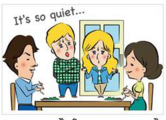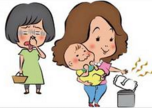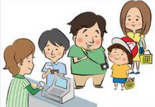Chinese tourists do not behave well in Japan as they do not have the etiquettes, as the inns and hotel associations are troubled by their behavior. Recently the number of Chinese tourists increased substantially as the seasonal cherry fruit has arrived in the market. The tourism department has issued “An Etiquette Guide” in which are shown with illustrations as to how they should behave in Japan. Last year hotel associations objected to having the Chinese tourists as they were not well behaved. The issued booklet would serve its purpose and keep the Hokkaido hoteliers happy and make the said tourist happy.
The booklet “Hokkaido Ryoko Joshiki” (“Common Sense When Traveling Hokkaido”), says, “Conversing gently is a good way of behavior. Japanese talk politely, making it sure that the voice is not raised. When compared to Americans or Chinese, they articulate in a gentle voice and are extremely polite. In Japanese culture, one has to talk thoughtfully and speaking gently is taken as a positive behavior. People wonder much if they hear others yelling or shouting.
The Japanese media widely covered about the Chinese behavior. Eventually, the booklet got followers in China and is in circulation in Chinese social media. Most of the Chinese have accepted the observations and feel that before going abroad the countrymen should pay attention and learn the desired behavior.
 Photo credit: Dainik Bhaskar
Photo credit: Dainik Bhaskar
People get annoyed if the rubbish is thrown freely anywhere.
Cleanliness gets noticed everywhere, and all the area around any habitation or a set up is kept superbly clean. No trash can get thrown on the roads. The booklet specifically mentions that on coming to Japan while throwing trash look where it should be disposed. Otherwise, the other people will explain you. The kids diapers have special bins for disposal.

Photo credit: Dainik Bhaskar
In Public Places bad habits get control through regulations:
There is a very strict control over smoking in public places as is found in many countries. In parks and wherever the kids play no smoking is allowed. If anyone does not follow this rule, the other people explain and make it the person understand.
Understand the Hotel Tariff:
In Japan, the hotel tariff is as per person and not as per the room. If there are more than two individuals in a room, the tariff is as per person. The same applies to food; the bill gets levied per person. It is better to understand the procedure and then calculate accordingly. Lots of Chinese had to go through the crisis of settling bills.
Do Not to open any packet before payment.
The impression that not all Chinese are lacking in etiquette, another updated booklet got produced recently. The booklet in March renamed as“Hokkaido ” (“The Traveler’s Etiquette Guide to Hokkaido”). The “X” got amended, and only bad manners got prominence and pointed out.For example, the old version indicated that ripping open packaging before purchasing a product, which is acceptable in China but is “a crime” in Japan. An illustration of it got marked with an “X.” The new version says instead, “In Japan, you can buy products with a sense of security that they are good, without opening their packages.” Via
Be punctual as timings are strictly followed.
Especially if you are travelling with other as a group. Make it a point to be in time. Otherwise, the Tour staff will get upset. The tour staff firmly believes that other members will get shocked.

Photo credit: Dainik Bhaskar
If there is a Longline you need to stay in the Que:
The Japanese are very particular about strictly following the rules. They ensure that others do not get disturbed because of them. One can notice this distinct aspect in the crowded places like in banks, subways, or while paying bills.

Photo credit: Dainik Bhaskar
The new Booklet’s wording got amended and no longer gives the impression that only the Chinese lacked manners. Besides, it has an English version as well. It is an objective type of list where crosses mean not to indulge in such behavior and ticks are approval.
The redefined etiquettes point out what Japanese consider as indecent conduct. It asks the tourists to remain discreet in the public. It means that belching, passing gas and other bodily functions should go unnoticed. Everybody knows these features are typical and, precautions are required.
Enough copies have been printed and brought out for distribution at inns, shops, restaurants and traveling points.








